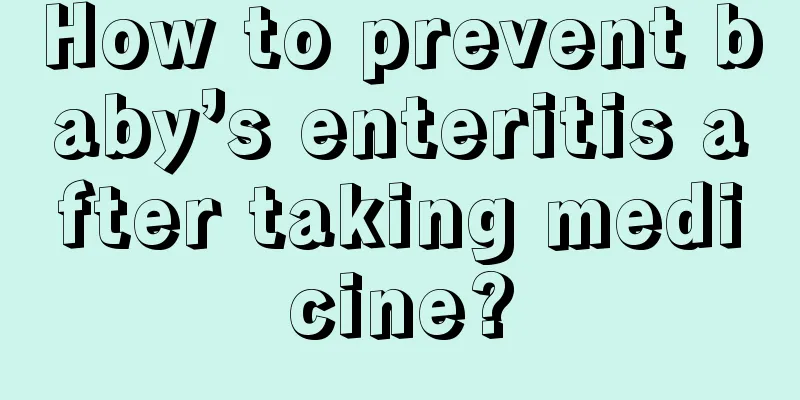How to prevent baby’s enteritis after taking medicine?

|
Spring is here. If you don't pay attention to your baby's diet, your baby may have poor gastrointestinal digestion. The baby's gastrointestinal development stage is relatively fragile. If the diet is improper, enteritis may occur. There are many causes of pediatric enteritis. It may be caused by bacterial enteritis or improper diet. It is possible that the mother has eaten bad food and the baby's gastrointestinal condition is caused through breast milk. If the baby has enteritis, go to the hospital for examination and treatment in time. In addition to medication for baby enteritis, it is also important to prevent baby enteritis. What is the better way to prevent baby enteritis after taking medicine? To prevent your baby from developing enteritis. 1. Causes of enteritis 1. Pathogens that cause enteritis often enter the digestive tract through contaminated tableware, food, etc. Therefore, strictly controlling the entrance is an important part of preventing and treating pediatric enteritis. 2. With the arrival of summer, the incidence of enteritis in children begins to increase. Pediatric enteritis is an intestinal infection caused by various pathogenic microorganisms, with bacterial enteritis being the most common. The clinical manifestations are mild and mainly gastrointestinal symptoms, manifested as increased frequency of bowel movements, increased water content, loose stools, egg-drop soup-like stools, watery stools, or stools with mucus, pus and blood. They may be accompanied by galactorrhea, vomiting, and loss of appetite, but there are no symptoms of dehydration or systemic poisoning. Most cases can recover within a few days. In addition to intestinal symptoms, severe cases also have obvious symptoms of dehydration, electrolyte and acid-base imbalance, and systemic infection and poisoning, such as fever, mental irritability or depression, drowsiness, and even convulsions, coma, shock, and toxic encephalopathy that are life-threatening. Some children may develop persistent or chronic malnutrition due to repeated attacks or improper treatment, which may affect their growth and development. 3. Pathogens that cause enteritis often enter the digestive tract through contaminated tableware, food, etc. Therefore, strictly controlling the entrance is an important part of preventing and treating pediatric enteritis. Parents should pay attention to the following aspects in daily life: 2. Feeding, make sure the food is fresh and clean The climate is hot in summer, and mosquitoes and flies breed. Many fruits, vegetables, and cooked foods are easily bitten by flies and contaminated with bacteria. Meat products, dairy products and other high-protein foods are also very easy to spoil in a warm environment. Therefore, parents should develop good eating and feeding habits, always ensure that the food is fresh and clean, and all kinds of raw and cold fruits and vegetables must be carefully washed before they can be eaten by children. Do not store various cooked foods in airtight containers. All cooked foods and dairy products that have been stored for a long time must be effectively heated and sterilized before they can be eaten. The milk should not only be boiled, but also boiled for 5 minutes to achieve the sterilization effect. Never feed your children expired, spoiled, or suspected spoiled food. 3. Pay attention to hygiene and keep tableware clean and non-toxic Unclean tableware and milk utensils are also a common cause of childhood enteritis. Some parents do not pay attention to the timely cleaning and disinfection of bowls, chopsticks, bottles and nipples, and do not pay attention to the different use of raw and cooked cutting boards, knives and containers, which can easily lead to bacterial contamination and cause diarrhea in children. Therefore, you should develop the habit of washing tableware and milk utensils immediately after meals and milk drinking, and use raw and cooked utensils and containers separately. Boil and disinfect tableware regularly, with each boiling time not less than 20 minutes. 4. Use the refrigerator scientifically and beware of the invasion of "refrigerator bacteria". In summer, many families are accustomed to putting watermelons, fruits, and cold dishes in the refrigerator without sealing them and eating them directly after chilling. Some people mistakenly believe that the food in the refrigerator will not deteriorate, so they take out the leftovers in the refrigerator and eat them directly without heating. Little do people know that the refrigerator is not a vacuum environment and contains many bacteria that can easily contaminate food. Therefore, fruits and vegetables that are to be eaten directly must be kept in a sealed manner in the refrigerator, and cooked food that is stored exposed in the refrigerator must be boiled and heated before consumption. The refrigerator should also be cleaned regularly, and raw and cooked food should be kept separate. |
<<: How to reduce fever quickly in children
>>: What is the reason for the baby's thumb to bend inward?
Recommend
Treatment for red eyelids in babies
Children's skin is very fragile, and frequent...
Why does the baby shiver?
What is the reason why the baby shivers? New pare...
Precautions for children with high urine protein
When there is a problem with the kidneys, the uri...
Can I continue to wean my baby if I feel uncomfortable weaning?
Milk powder is the food that babies need the most...
The best period for baby's brain development
There is an optimal period for the development of...
What should I do if my child has low white blood cell count and fever?
If a child has repeated fevers and is found to ha...
What causes baby's palms to sweat?
Today's babies are the sweethearts of the fam...
What can I do to improve my baby's cough at five months old?
Recently, many people have consulted me saying th...
A 10-year-old boy can't sleep at night?
The quality of a child's sleep has a great im...
Is hyperactivity in children due to zinc deficiency and how to supplement zinc
Recently, many children have shown signs of hyper...
How to treat Yin deficiency and internal heat in children
Since kidney deficiency mainly affects the sexual...
What to do if your child has high astigmatism
As living standards improve, families are becomin...
Symptoms of calcium deficiency in newborn babies
Every parent hopes that their baby will be happy ...
Why does a 10-month-old baby sleep restlessly at night?
There are many reasons why babies cannot sleep we...
What does it mean if a child has a fever in the afternoon?
Many children will have a fever in the afternoon,...









